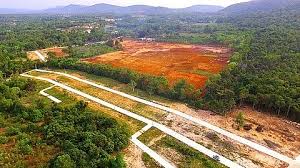Land speculation, at its best, is a high-risk, high-return investment with no tax advantages. At its worst, it is a haven for con artists, filled with high-level cooperation.
The goal of land speculation is to invest in undeveloped areas that are projected to experience a development boom. Then you may sell the land as developers step in or build it yourself. However, carrying out this straightforward idea is frequently more difficult than individuals imagine.
What is Land Speculation?
Land speculation is a financial activity that entails purchasing real estate with the expectation that the price will rise. Because land tends to rise in value over time due to variables such as scarcity, most land purchases are best referred to as real estate investments. Speculating on land often entails the acquisition of real estate that may lose value, and it frequently relates to events that occurred during the early history of the United States. Because there were wide swaths of public land available for much of the country’s history, land speculators occasionally purchased big pieces with the purpose of keeping them off the market. This act of land speculation could drive up prices, but it could also have negative consequences.
The Fundamentals of Land Speculation
New York City wasn’t always buzzing with activity and high-rise apartment towers as far as the eye could reach. It took nearly a century for the Big Apple to develop into the metropolis that it is today. During that time, the city’s land was purchased, sold, and transformed into one of the world’s most expensive real estate markets. Those who were successful in capitalizing on land developments had perfected the art of land speculation.
Land speculation (sometimes known as “land banking”) is the practice of purchasing vacant land and keeping it until development interest in the region increases. Land speculation is a real estate investing method that has been used for millennia. One of the clearest examples was when Walt Disney began secretly purchasing central Florida farms in the mid-1960s.
Quick Tips for Land Speculation
Here are a few key guidelines to keep in mind while thinking about a land speculation investment.
#1. The local economy
You must conduct due diligence on the surrounding local economy to ensure that it is strong enough to support you speculating on neighboring land. Not only must the local economy be strong, but there must also be significant chances for future growth. Check to see if the local government is actively attempting to expand or bring in new jobs, as well as the present situation of the housing market. All of these factors will give you a decent picture of how the economy will develop in the future.
#2. Sales Taxes
Consider local tax sales, as you may be able to acquire a distressed sale for a fraction of the price of a typical resale asset.
#3. Lawyer
You’ll need an excellent legal team to ensure that no risk has been passed on to you, the buyer, from any previous owner of the land. Because unoccupied land in underdeveloped areas is usually less expensive, speculators would try to save money on legal fees by doing it themselves and using template paperwork. This can be disastrous, leaving land speculators open to litigation and legal risk.
Is Land Speculation Profitable?
The idea behind land speculation is that a future economic event will drastically boost its value, allowing it to be sold for a profit. The most successful land speculators essentially “guesstimate” the likelihood of future economic growth in a certain area. As developers start looking for projects, prime landowners stand to profit handsomely.
Obviously, not every land speculation investment yields the same returns as New York City or central Florida. It’s difficult to predict where the next region will be, bubbling beneath the surface and ready to explode with profits. However, you can aid your prediction in a variety of ways.
To begin, land speculation is similar to any other type of real estate investment in that success is dependent on diligence. You need to grasp issues like the local economy, the probability of urban expansion, housing construction, and big employers and/or industries preparing to relocate into the region.
It is also worth noting that entitlements increase the value of land. Your land must have the necessary rights, such as proper zoning, the ability for builders to obtain the necessary licenses, and other development-ready permissions.
Another factor to consider is the size of the investment. Investing in real estate does not necessarily necessitate a large sum of money, but it is critical to determine how much you are willing to invest and the earnings you expect to generate. Before committing to a land investment, it is critical to assess the benefits and drawbacks.
Why is Land Speculation a Good Investment?
Land speculation has numerous advantages. The profits on rural or urban land speculation are excellent if the correct regions and land are chosen. Here are some more advantages and factors to consider for investors.
#1. Reduced purchasing price
Because land speculation involves a future bet on a specific plot of land, the entry barrier is usually low. Unproductive and unoccupied land is typically the least expensive sort of real estate to purchase.
#2. Reduced holding costs
In general, land in this investment class does not generate any services or income. As a result, holding expenditures such as property tax and insurance are minimal.
#3. Diversify your possessions.
Typically, land speculators will not purchase a single property and wait on it. They will diversify their interests in a variety of regions in order to maximize potential future rewards. In this sense, investors might own land in a variety of locations, depending on future economic development to increase land values and generate good financial returns.
#4. Significant potential benefits
Because you’re buying unserviced unoccupied land, you’re frequently paying a low price for the property. However, as growth occurs and services, businesses, and inhabitants begin to congregate, land values will skyrocket. As a result, if you find the right location for your land speculation, you might make big returns on your initial investment.
#5. Farmland
Land ownership in a rural farming area might provide the land speculator with an attractive revenue stream as they wait for future economic development. The speculator can charge land rent for the farmland, which the renter will use for agricultural purposes.
#6. Wood
You may be able to harvest the trees via logging on vacant woods land. This can provide a revenue stream while you are sitting on the land.
The Drawbacks of Land Speculation
Land speculation, like any other investment technique, has significant drawbacks. For one thing, because you don’t have any income, you’ll almost certainly have to pay cash for the land. Furthermore, if a loan is used, the loan-to-value ratio is typically significantly lower, and interest rates are higher.
Furthermore, land speculation is dangerous by definition since you are speculating. Based on your analysis, there is a chance that future economic activity will occur in and around the land you are purchasing; but, there is no certainty that this will occur. Finally, because undeveloped land cannot be depreciated, there are less tax advantages to this real estate investment plan.
Return of Land Value and Recycling
The majority of communities engage in some type of land value return and recycling (LVRR). That portion of the property tax levied on land values is returned to the public sector, where it can be recycled to assist make infrastructure financially self-sustaining.
However, most communities only capture a small portion of the land value that they generate. Property tax rates in most municipalities range between 1% and 2% of market value. If this stream of payments were to be consolidated into a single, one-time payment, it would be worth approximately $10 to $20 for every $100 of publicly created land value. As a result, most communities give away 80 to 90 percent of the land value they generate. Most communities’ best-served land is owned by affluent individuals and companies. As a result, most communities collect taxes from everyone and enrich those who are already wealthy by providing infrastructure. This is a contributing factor to rising inequality.
Some localities use LVRR more aggressively. They get the following outcomes:
#1. Decreasing the cost of land
Land prices reflect the benefits that individuals expect to obtain from owning it. Taxing land values more heavily diminishes ownership benefits, lowering the price prospective buyers will pay.
#2. Reduced taxes on privately developed building values.
This lowers the cost of building construction, improvement, and maintenance. (This is beneficial to both citizens and companies.)
#3. Taxes that are understandable, justifiable, and equal.
Landowners pay in proportion to the benefits obtained by the public.
#4. Reduced sprawl
Taxes are higher where land values are high, encouraging development on these places to produce revenue to pay the tax. High-value sites are located near current infrastructure assets (e.g., parks, transit, etc.), and this is where we want development to take place. Increased growth near existing infrastructure relieves development pressure in remote areas, resulting in less sprawl. Compact cities necessitate less infrastructure investments. They are more environmentally and fiscally sustainable.
Conclusion
If done right, land speculation can be an excellent real estate investment strategy. Due diligence and strategy, like with any real estate investment, are the linchpins of making sound financial decisions. Land speculation is no exception.
Land speculation takes time and patience, and it is not for the investor looking for a quick buck, but for those with long-term vision and patience.
Due diligence and a solid strategy are two methods to improve your chances of investing in a property that will pay dividends in the future. Before you decide whether land speculation is correct for you, you must first grasp the benefits and drawbacks.
You’ll need a strong legal team, a long-term vision, and a diverse portfolio of unoccupied and underutilized land waiting to be snatched up by developers when economic activity in your area increases. Begin by examining your local real estate market: Where would you invest in unoccupied land in your neighbourhood if you were going to speculate?
Land Speculation FAQs
What is speculation in real estate?
Property speculation is a method of investing in real estate in which expected earnings are based on changes in local market conditions rather than physical renovations or rentals. As a result, property speculation is a high-risk, high-reward venture in which properties are frequently acquired and sold at a rapid speed.
Is speculation good for economy?
Speculators offer liquidity to the markets, contribute to price discovery, and take on risks that other market participants want to offload. Speculators in commodities markets help keep markets functioning and prevent shortages of goods by bidding them up when prices fall and paying the middlemen who connect supply chains.
Why are Americans so obsessed with land?
Generations of Americans, beginning with colonists who had never had the opportunity to own property in Europe, saw land as a symbol of potential; the wide continent shone in their eyes, and its border beckoned them west.
What is the effect of land speculation?
Land speculation renders the land distribution process discriminatory, reducing its availability.
What was the reason for the speculation in land?
The goal of land speculation is to purchase undeveloped regions where a development boom is forecast.






